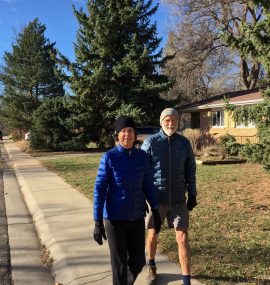It’s not that exercise lacks benefits
What about costs, lack of time, physical limitations?
Regular physical activity reduces risks of cardiovascular diseases, obesity, falls, cognitive impairments, osteoporosis, and muscular weakness. By contrast, the sedentary lifestyle that typifies many older people predicts premature onset of ill health, disease, and frailty. Physical activity is safe for healthy and even frail older adults. Research from the United Kingdom showed that from 2008 to 2013, life expectancy rose about one year, while health expectancy declined by 1.5 years. The resulting health deficit (expected longevity minus health living expectancy) increased from 15.5 to 16.1 years. Do you want to spend the last 16 years of your life sick and frail?
You can increase your Quality of Lifespan by making better lifestyle choices, such as regularly getting enough physical activity. For example, daily brisk walking predicts a 50-80 percent lower risk of mobility impairments. Wide-spread of public health messages extol the benefits of physical activity. But only about one-fifth of older UK residents (and older Americans, as well) get the minimum recommended amount (150 minutes per week at moderate intensity). Why not? Commonly cited reasons include costs, lack of time, and physical limitations. But how much cost does walking around the block entail? A pair of decent shoes? How is it that retirees don’t have enough time to exercise? I concede that some seniors have physical limitations, but a large proportion can at least walk around the block. If these reasons are suspect, what are the real reasons?
The UK research suggests four plausible reasons. The first is lack of self-efficacy toward exercise. That is, lack of confidence in one’s ability to exercise. The second is lack of positive expectations that exercise will produce substantial benefits. The third reason is lack of intrinsic enjoyment of physical activity. The final reason is lack of social support from exercise-minded friends and associates. Would you be willing to remove one of these barriers in your life to exercise? Then another? And another? If so, you’d be more likely to get regular physical activity you need and enjoy the huge benefits it brings both now and later.








